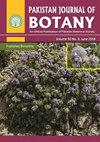Efficacy of plant growth promoting microbes in inducing systemic resistance to root rot and physiochemical properties of tomato fruit
IF 0.9
4区 生物学
Q4 PLANT SCIENCES
引用次数: 0
Abstract
Tomato production and quality are of great economic importance, but farmers face significant losses due to root rot infection, which affects tomato yield. Globally, a wide range of chemical pesticides are used to control plant diseases that have an impact on the environmental and nutritional content of the crop. In this scenario, plant growth-promoting microorganisms (PGPMs) are safe and effective substitutes for the control of root infections. In this study, we have investigated the effect of different plant growth promoting microorganisms (PGPMs) on the suppression of root rot disease in tomato plants. In field plot experiments, conducted in the season I and repeated in season II, the application of PGPMs improved the systemic resistance of plants against root rot pathogens via improving the functioning of antioxidant molecules. They considerably reduced the infection caused by Macrophomina phaseolina, Rhizoctonia solani, Fusarium solani, and Fusarium oxysporum compared to untreated control plants . Isolates of PGPMs significantly ( p<0.05 ) enhanced the amount of total phenol, and salicylic acid with an improvement in crop yield and quality of fruit (dry matter, soluble solids, fruit acidity, and lycopene content). In season I, Penicillium (Pen1-R) whereas in season II, Trichoderma (ET-6) treated plants produced the highest quality of tomato fruit with better plant growth and suppression of root rot disease. In both seasons, Penicillium and Trichoderma were found to be effective as compared to untreated control plants and plants treated with carbendazim, a commercial fungicide. This research will help to make an impact on the production of tomatoes in a sustainable way.植物生长促进微生物诱导番茄根腐病系统抗性的效果及果实理化特性研究
本文章由计算机程序翻译,如有差异,请以英文原文为准。
求助全文
约1分钟内获得全文
求助全文
来源期刊

Pakistan Journal of Botany
生物-植物科学
CiteScore
2.40
自引率
8.30%
发文量
218
审稿时长
8.4 months
期刊介绍:
The Pakistan Journal of Botany is an international journal for publication of original research in plant science. Work on all plant groups, including fossil plants, is published. The journal publishes in the areas of: ecology and ecophysiology; conservation biology and biodiversity; forest biology and management; cell and molecular biology; paleobotany; reproductive biology and genetics; mycology and pathology; and structure and development.
 求助内容:
求助内容: 应助结果提醒方式:
应助结果提醒方式:


